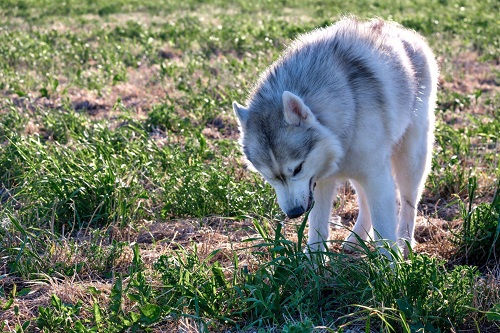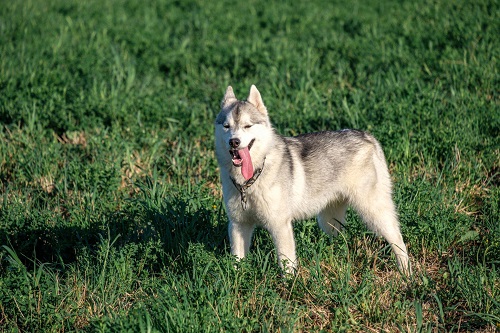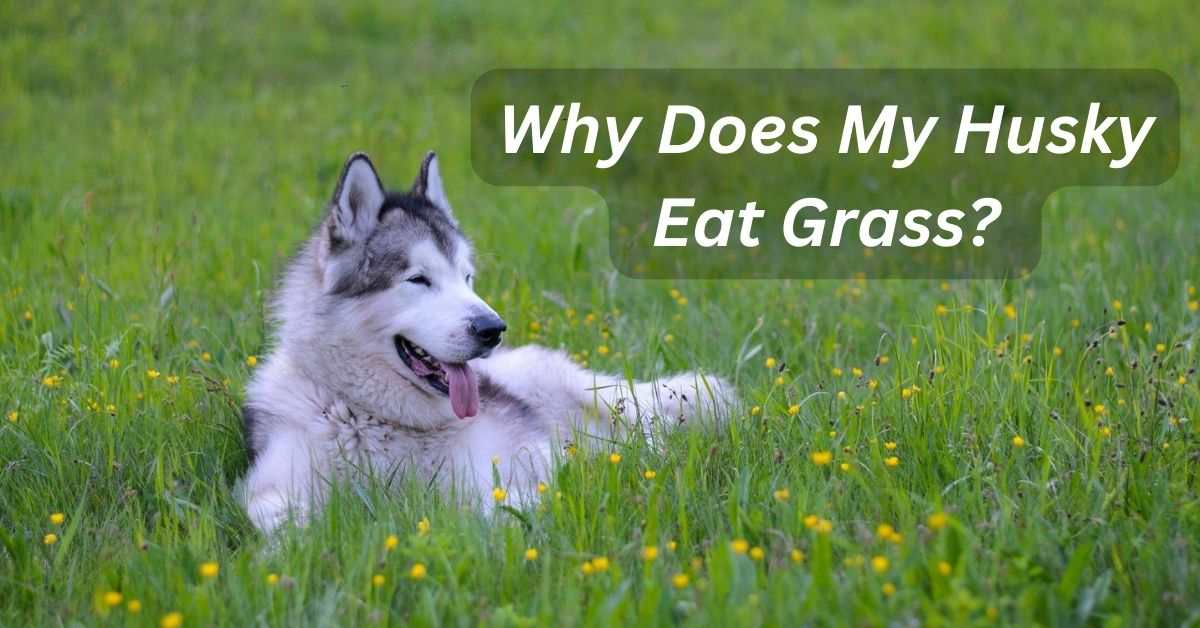Have you ever wondered why your beloved Husky occasionally indulges in a peculiar snack – grass? It’s a common behavior that might leave you scratching your head.
As well as exploring the reasons behind this grass-munching behavior, this article will delve into the fascinating world of Husky behavior.
So, let’s solve the puzzle of “Why Does My Husky Eat Grass?” and gain an understanding into your furry friend’s quirky habits.
Is Eating Grass Bad for Your Husky?
Eating grass is not necessarily bad for your husky, as long as they do it in moderation and the grass is clean and safe. However, there are some risks and drawbacks associated with eating grass that you should be aware of.
These include ingesting harmful substances from grass treated with pesticides, herbicides, or fertilizers. Using the best artificial grass cleaner for dog urine can help keep your husky’s grass clean and free of toxins.
- Ingesting harmful substances: The grass that your husky eats may be contaminated with pesticides, herbicides, fertilizers, or other chemicals that could be toxic to them. The grass may also harbor parasites, bacteria, fungi, or viruses that could cause infections or diseases. The grass may also contain sharp objects, such as stones, sticks, or glass, that could injure their mouth, throat, or digestive tract.
- Developing gastrointestinal problems: Eating too much grass could cause your husky to vomit or have diarrhea, which could lead to dehydration, electrolyte imbalance, or weight loss. Eating grass could also worsen existing gastrointestinal problems, such as gastritis, ulcers, colitis, or pancreatitis.
- Developing allergies: Some huskies may be allergic to grass or some of its components, such as pollen or mold. Eating grass could trigger an allergic reaction that could manifest as itching, sneezing, coughing, wheezing, hives, swelling, or anaphylaxis.
- Developing behavioral problems: Eating grass could become a compulsive habit for your husky if they do it too often or for the wrong reasons. This could interfere with their normal activities and affect their quality of life. Eating grass could also indicate an underlying psychological issue, such as anxiety, stress, depression, or boredom.
What Does It Mean When Your Husky Eats Grass?
There are several possible reasons why your husky may eat grass. Some of them are:
- They are bored: Huskies are very active and intelligent dogs that need a lot of mental and physical stimulation. If they are not getting enough exercise, play, or attention, they may resort to eating grass as a way to relieve their boredom or frustration.
- They are curious: Huskies are also very curious and adventurous dogs that like to explore their surroundings. They may eat grass to taste it, smell it, or investigate it. They may also eat grass to mimic other dogs or animals that they see doing it.
- They are hungry: Huskies have a high metabolism and need a lot of calories to maintain their energy levels. If they are not getting enough food, or if they have a nutritional deficiency, they may eat grass to try to fill their stomachs or get some extra nutrients.
- They have an upset stomach: Huskies may eat grass to induce vomiting or diarrhea when they have an upset stomach. This could be caused by eating something spoiled, toxic, or indigestible, or by having a gastrointestinal infection, parasite, or disease. Eating grass may help them get rid of the offending substance or soothe their irritation.
- They have a genetic predisposition: Huskies are descendants of wolves, which are omnivorous animals that eat both meat and plants. Eating grass may be an instinctive behavior that is inherited from their ancestors. Some researchers believe that eating grass helps dogs balance their diet, improve their digestion, or expel parasites.

How to Stop Your Husky from Eating Grass?
If you want to stop your husky from eating grass, you need to address the root cause of their behavior and provide them with alternatives. Here are some tips to help you:
- Check their health: Take your husky to the vet for a thorough examination and rule out any medical conditions that could be causing them to eat grass. Follow the vet’s advice on how to treat any issues and prevent them from recurring.
- Check their diet: Make sure your husky is getting enough food and water throughout the day and that their food is high-quality and balanced. Avoid giving them table scraps, human foods, bones, or anything that could upset their stomach or harm their health. Consider adding some fiber-rich foods or supplements to their diet to help their digestion and bowel movements.
- Check their environment: Keep your husky away from any grass that is treated with chemicals or contains harmful substances. If possible, choose organic or natural grass for them to play on. Alternatively, you can plant some dog-friendly herbs or edible plants in your yard for them to nibble on instead of grass.
- Check their behavior: Observe your husky’s behavior and try to identify any triggers or patterns that make them eat grass. For example, do they eat grass when they are bored, anxious, or lonely?
Do they eat grass after a meal, before a walk, or during a thunderstorm? Do they eat grass only in certain places, times, or seasons? Once you know the reasons behind their behavior, you can try to modify them or provide them with alternatives.
- Provide them with stimulation: Huskies need a lot of mental and physical stimulation to keep them happy and healthy. Make sure your husky gets enough exercise, play, and attention every day.
Provide them with toys, games, puzzles, and challenges that engage their senses and intellect. Teach them new tricks, commands, or skills that boost their confidence and bond with you. Socialize them with other dogs and people that are friendly and fun.
- Deter them from eating grass: If your husky still tries to eat grass despite your efforts, you can try to deter them from doing it by using some positive or negative reinforcement techniques.
For example, you can reward your husky with treats, praise, or affection when they ignore the grass or focus on something else. You can also redirect your husky’s attention to a toy, a command, or an activity when they show interest in the grass.
You can also use a spray bottle, a noise maker, or a verbal correction to startle or discourage your husky from eating grass.
When to See a Vet for Your Husky’s Grass-Eating Habit?
While eating grass is not usually a cause for concern for your husky, there are some situations when you should see a vet as soon as possible. These include:
- Your husky is eating grass excessively or compulsively
- Your husky is eating grass but not their food
- Your husky is eating grass and vomiting or having diarrhea frequently
- Your husky is eating grass and showing signs of pain, discomfort, or distress
- Your husky is eating grass and having an allergic reaction
- Your husky is eating grass that is contaminated or poisonous

Final Overview
Eating grass is a common and natural behavior for dogs, including huskies. However, it could also indicate some health or behavioral problems that need to be addressed.
If you want to stop your husky from eating grass, you need to find out the reason behind their behavior and provide them with alternatives.
You also need to monitor their health and well-being and consult your vet if you have any concerns. By doing so, you can help your husky enjoy a happy and healthy life.
